Flexibility and strengthening exercises for ankylosing spondylitis
Exercises for ankylosing spondylitis should be gentle and frequent. The exercises shown here are good to do twice each day. Don't do them first thing in the morning, when you may feel more stiff. In the morning, take a walk to get loosened up for the day. Then try doing these exercises around lunch time and in the evening. Or, do one or two exercises at a time and spread them out through the day. You can do the exercises in any order that you like.
Talk with your doctor or physical therapist if you have questions about how to do these or any other exercises.
Back stretches
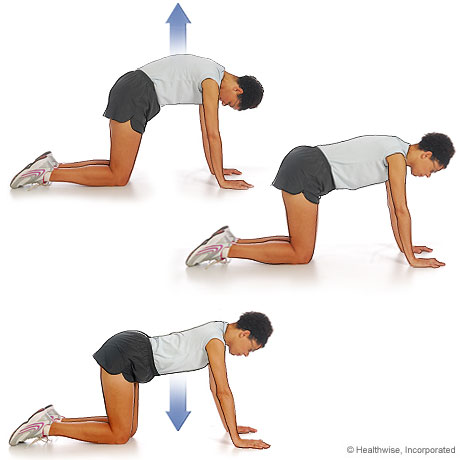
- Get down on your hands and knees on the floor.
- Relax your head and allow it to droop.
- Round your back up toward the ceiling until you feel a nice stretch in your upper, middle, and lower back.
- Hold this stretch for as long as it feels comfortable, or about 15 to 30 seconds.
- Return to the starting position with a flat back while you are on your hands and knees.
- Let your back sway by pressing your stomach toward the floor. Lift your buttocks toward the ceiling.
- Hold each position for 15 to 30 seconds.
- Repeat 2 to 4 times.
Chest expansion
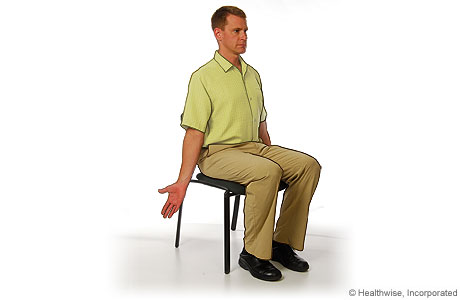
- Sit comfortably with your feet shoulder-width apart. You can also do this exercise standing up.
- Look straight ahead and do not allow your head to tilt back. As you take a deep breath, open your arms out to the sides and roll your arms back. Your palms will turn out and you will feel a stretch across your chest.
- Breathe normally as you hold this stretch for 15 to 30 seconds.
- Lower your arms to your sides and let your palms turn back toward your legs as you slowly let out your breath.
- Repeat 2 to 4 times.
Upper back and shoulder stretch
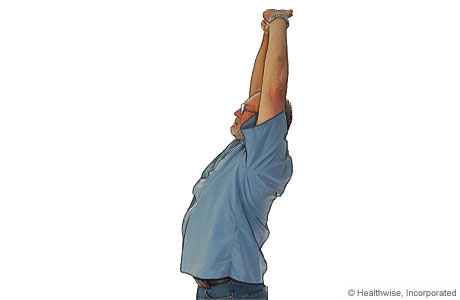
- Stand up straight, or sit in a firm chair.
- Looking straight ahead, breathe in as you raise both arms over your head and reach toward the ceiling. Do not allow your head to tilt back.
- Reach back with your arms to stretch your shoulders.
- Breathe normally as you hold this stretch for 15 to 30 seconds.
- Return to the starting position.
- Repeat 2 to 4 times.
Neck stretches
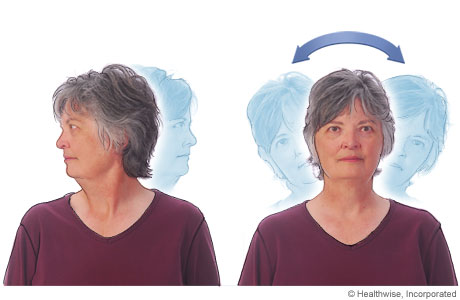
Turning the head
- Sit in a firm chair, or stand up straight.
- Keep your chin straight, turn your head to the right, and hold for 15 to 30 seconds.
- Turn your head to the left and hold for 15 to 30 seconds.
- Repeat 2 to 4 times to each side.
- Next, you can do some head tilts. Keeping your chin pointing straight ahead, tip your right ear to your right shoulder and hold for 15 to 30 seconds.
- Tip your left ear to your left shoulder and hold for 15 to 30 seconds.
- Repeat 2 to 4 times to each side.
Press-up back extension
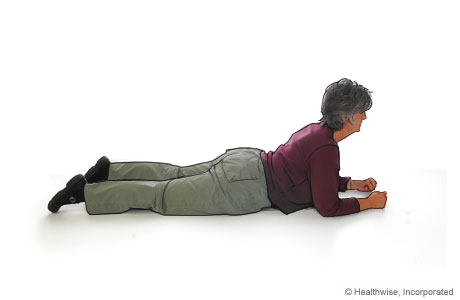
- Lie on your stomach, supporting your body with your forearms.
- Press your elbows down into the floor to raise your upper back. As you do this, relax your stomach muscles and allow your back to arch without using your back muscles. As your press up, do not let your hips or pelvis come off the floor.
- Hold for 15 to 30 seconds, then relax.
- Repeat 2 to 4 times.
Alternate arm and leg (bird dog) exercise
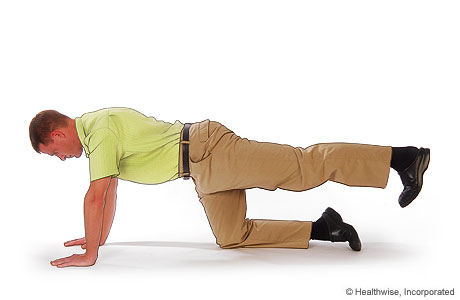
Note: Do this exercise slowly. Try to keep your body straight at all times, and do not let one hip drop lower than the other.
- Start on the floor, on your hands and knees.
- Tighten your stomach muscles.
- Raise one leg off the floor, and hold it straight out behind you. Be careful not to let your hip drop down, because that will twist your trunk.
- Hold for about 6 seconds, then lower your leg and switch to the other leg.
- Repeat 8 to 12 times on each leg.
- Over time, work up to holding for 10 to 30 seconds each time.
- If you feel stable and secure with your leg raised, try raising the opposite arm straight out in front of you at the same time.
Current as of: July 18, 2023
Author: Healthwise Staff
Clinical Review Board: All Healthwise education is reviewed by a team that includes physicians, nurses, advanced practitioners, registered dieticians, and other healthcare professionals.
This information does not replace the advice of a doctor. Healthwise, Incorporated, disclaims any warranty or liability for your use of this information. Your use of this information means that you agree to the Terms of Use. Learn how we develop our content.
